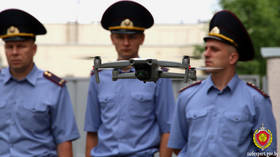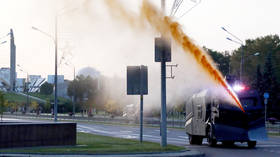While Brussels publicly condemned violent Belarus protest crackdown, EU funds paid for 15 surveillance drones in Minsk

During the police suppression of post-election protest in Belarus, the authorities in Minsk bought surveillance drones with almost $900,000 of EU money. And it happened as Brussels publicly condemned the Lukashenko government.
The funds to purchase the 15 drones was provided through a Latvia-Lithuania-Belarus cross-border cooperation program – part of the EU’s European Neighborhood Instrument, the mission of which is to promote human rights, development, and European Market integration in nearby countries.
According to the country’s State Forensic Examination Committee, the drones will be used in Minsk, Vitebsk, and Grodno to help “in the inspection of man-made and natural disasters, and traffic accidents, and the search for people in the woods.”
Also on rt.com In unprecedented step, UK & Canada impose sanctions on Lukashenko & other Belarus big wigs over ‘rigged elections’ & ‘repression’Although the purchase was made in mid-September, news of the story began to break in the international press only in the past few days, prompting questions as to why €765,082 ($899,000) of EU money was being used for this sort of equipment during widespread protests and their violent suppression.
According to the online newspaper EUobserver, Belarusian opposition activists have expressed fears that the drones could be used against them, by aiding in the identification of protesters and therefore their potential arrest.
Belarus’s northern neighbor Lithuania, a member of the cross-border cooperation program, has been quick to distance itself from the provision of the drones, calling the transfer of funds to Minsk a “contractual obligation.” Speaking to LRT, Lithuania’s national public broadcaster, Police Commissioner-General Renatas Požėla explained that Vilnius “did not make any acquisitions on the Belarusian side,” but simply sent the funds, which was done “before the [August 9] elections in Belarus.”
On October 2, the EU imposed sanctions, including a travel ban and an asset freeze, on 40 Belarusians it alleges were involved in repression and election falsification.
On August 9, Alexander Lukashenko was elected as Belarusian president for a sixth term, in a vote many consider to have been rigged. According to the official results, he received 80.10 percent of the vote, with opposition candidate Svetlana Tikhanovskaya receiving just 10.12 percent. After the polling stations closed, mass protests began against what was perceived to be the falsification of results. During the first few days of those demonstrations, police and soldiers used tear gas, stun grenades, and rubber bullets to disperse the protesters, and strikes began at large factories. In the weeks since, the protests have become less frequent and less violent, but still attract thousands of Belarusian citizens.
If you like this story, share it with a friend!















